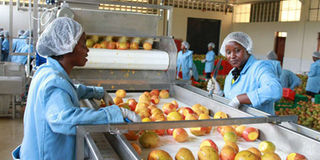UK-based paper gives devolution top marks

Employees clean mangoes at the Makueni Fruits Processing Plant in Kalamba, Makueni County. According to the influential UK-based Financial Times newspaper, devolution has already enabled some small scale agricultural producers to get better prices for their products through recently established fruit and vegetable processing plants. PHOTO | FILE | NMG
What you need to know:
- According to a four-page, devolution has already enabled some small scale agricultural producers to get better prices for their products.
The FT cites the example of Makueni, which helped 12,000 local farmers to get five times what they were getting for their mangoes.
But in the long term, the report warns that many of the 47 counties are “too small to attract investors.
Devolution can bring big economic benefits to Kenya, but only if the 47 counties join regional blocs to attract investment.
According to a four-page report in the influential UK-based Financial Times newspaper, devolution has already enabled some small scale agricultural producers to get better prices for their products through recently established fruit and vegetable processing plants.
The FT cites the example of Makueni, which helped 12,000 local farmers to get five times what they were getting for their mangoes. But in the long term, the report warns that many of the 47 counties are “too small to attract investors. Nigeria, which has a population four times that of Kenya, has only 37 states, including the capital. To counter this, some governors have formed regional blocs to attract investors and development agencies.”
FUTURE
The FT cites the Frontier Counties Development Council, a bloc of seven counties in northern Kenya, as a good example.
The bloc has attracted $1.1 billion in investment from the United Nations and the World Bank for projects ranging from roads to water to agriculture.
The “Investing in Kenya” report also paints a positive picture of the country’s economic future, saying business confidence “has improved dramatically”, particularly after the ceasing of hostilities and the handshake between President Uhuru Kenyatta and opposition leader Raila Odinga.
TOURISM
“The economy, which grew at 4.9 per cent in 2017, is expected to expand to 5.8 per cent this year,” the report says.
Tourism sector is also doing well, with record receipts of $1.2 billion last year, providing employment to 1.1 million people.
The report also praises investment in renewable energy infrastructure such as geothermal, solar, wind and hydro electricity — with half of Kenyans now having access to electricity, which is high by African standards.
DEBT
However, the report points out that although Kenya is doing well, it has been overtaken by Ethiopia as the largest economy in the region, although not in per capita terms. Growth rates in Tanzania and Rwanda are also outpacing Kenya.
The report says too many high profile infrastructure projects, such as the new Nairobi-Mombasa rail line and the wind farm beside Lake Turkana, have suffered from claims that they are too expensive and lack value for money, as a result of corruption.
The FT also says that while Kenya’s national debt “looks manageable in GDP terms, debt service ratios are worryingly high, particularly since the government continues to run a budget deficit of seven per cent.”





